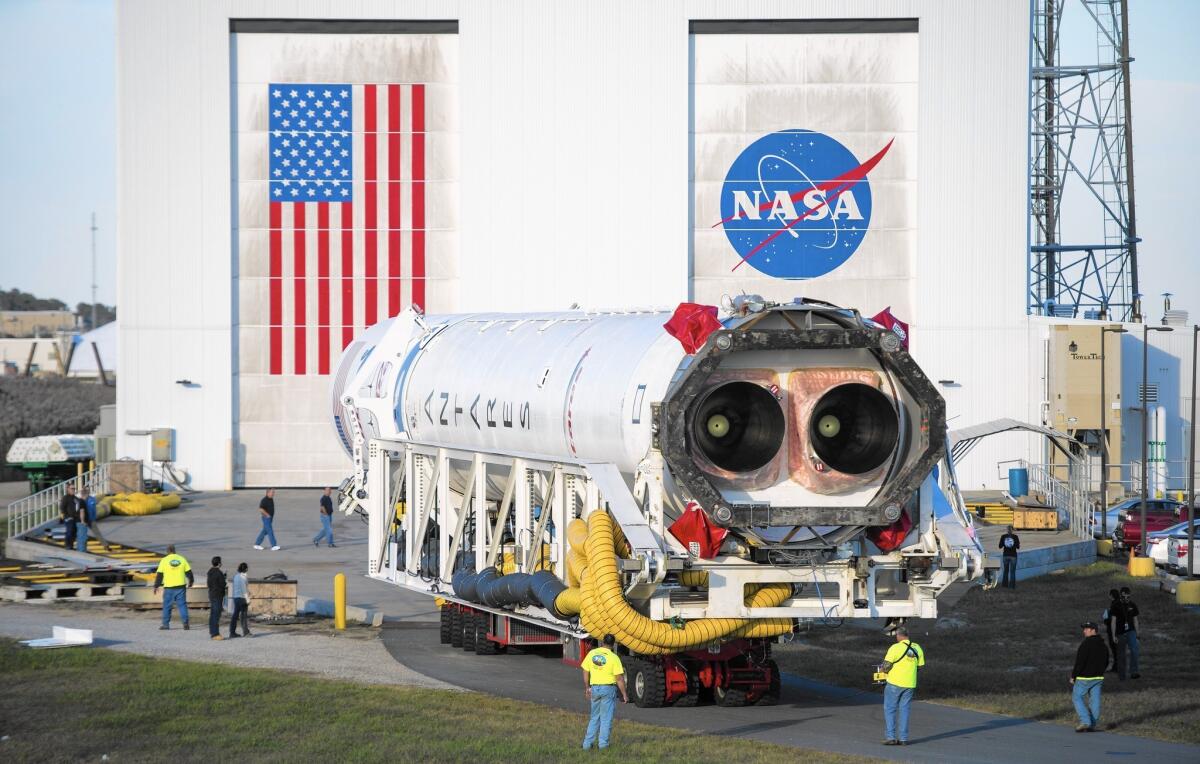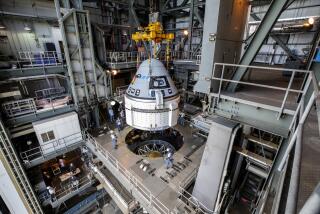Initial probe of unmanned rocket explosion points to engines, exec says

- Share via
An initial investigation of last week’s explosion of an unmanned rocket bound for the space station is pointing to a failure of the decades-old Russian engines used to launch it, Orbital Sciences Corp. executives said Wednesday.
As a result, Orbital will no longer use the rocket engines, which were built in the 1960s and 1970s during an unsuccessful attempt by the Soviet Union to take cosmonauts to the moon. The engines were later purchased by Aerojet Rocketdyne, refurbished and supplied to Orbital for NASA’s cargo missions.
The Oct. 28 explosion of Orbital’s Antares rocket caused no injuries, but it destroyed a capsule carrying more than two tons of supplies, equipment and experiments to the International Space Station. NASA officials said after the crash that the engines had passed all the required pre-launch tests.
But two of the reworked Soviet-era engines, known as the AJ-26, had exploded in two early ground tests, including one in May and another in 2011.
“Current evidence strongly suggests that one of the two AJ-26 main engines that powered Antares first stage failed about 15 seconds after ignition,” David Thompson, Orbital’s chairman, said Wednesday in a conference call.
“I want to stress that more analysis will be required to confirm that this finding is correct,” he added.
The explosion, just seconds after the rocket lifted off from a Virginia launch pad, was the first time a cargo mission contracted by NASA to a private company had failed. It happened just three days before a second catastrophe for the commercial space industry: the crash of Virgin Galactic’s SpaceShipTwo during a test flight in California’s Mojave Desert, which killed one of two pilots.
Under its agreement with NASA, Orbital must carry 20 tons of cargo to the space station by the end of 2016. To do that, Thompson said the Dulles, Va., company was hastening its previous plans for an improved rocket system that did not use the AJ-26.
And in the meantime, he said, Orbital plans to contract with another rocket company for its next one or two cargo shipments. Thompson said Orbital was talking to two U.S. companies and one in Europe.
Among the American companies with the ability to launch cargo to the space station is Elon Musk’s SpaceX, short for Space Exploration Technologies Corp. The Hawthorne company also carries cargo for NASA. It’s next rocket bound for the space station is scheduled for Dec. 9.
A spokesman for SpaceX declined to comment Wednesday.
If Orbital’s investigation eventually proves that the explosion was caused by one of the Russian engines, it will be a financial blow to Aerojet Rocketdyne, a division of GenCorp Inc. in Sacramento.
Aerojet Rocketdyne builds rocket engines at a 47-acre facility in Canoga Park. The company is perhaps best known as the maker of the space shuttles’ main engines.
In the 1990s, Aerojet Rocketdyne bought dozens of the powerful Russian engines, and it still has some in storage. GenCorp executives did not return two messages seeking comment Wednesday.
In Wednesday’s conference call, Gary Liebowitz, an analyst with Wells Fargo, asked Thompson why Orbital had decided to stop using the AJ-26.
“I guess it’s fair to conclude that what you think caused the problem is not something that would have been detected during testing, but is a fundamental reliability issue with the engine,” Liebowitz said to Thompson.
“I would say that’s a good assessment,” Thompson replied.
Twitter: @melodypetersen
More to Read
Inside the business of entertainment
The Wide Shot brings you news, analysis and insights on everything from streaming wars to production — and what it all means for the future.
You may occasionally receive promotional content from the Los Angeles Times.











